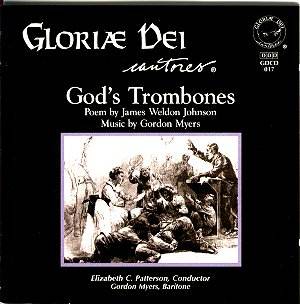Gordon Myers is baritone who has appeared in Broadway
and off Broadway shows. In addition he has a reputation as a musical
humorist as well as being something of a pedagogue and a composer. The
music on this CD was written in 1960 as part of his doctoral thesis
at Columbia University. The music sets the text of James Weldon Johnson's
'Gods Trombones - Seven Negro Sermons in Verse'. Johnson's text was
published in 1927 and has become a classic of American literature. Johnson
(1871 - 1938) was the first black admitted to the bar in Florida. He
and his composer brother wrote a number of successful Broadway musicals
and popular songs in the early 1900s. His text for 'Gods Trombones'
was produced as a result of hearing an old-time Negro preacher in Kansas
City. Evidently at the time he wrote the poems this style of preaching
was fast disappearing.
'God's Trombones' mixes unaccompanied chorus with passages
for the solo baritone, sometimes accompanied by the brass and sometimes
by the chorus. Obviously, in setting the work the words were paramount
for Myers and his setting reflects this. Even the most complex choral
passages are laid out so that they rarely obscure the words. It was
a shame that the choruses concern for a beautifully blended sound in
the opening movement rather obscured the text, but for the remainder
of the work their diction is often exemplary.
Much of the choral part is laid out like hymnody or
like Anglican Psalm singing. The more developed choral sections have
a strong touch of spirituals about them and I did wonder whether the
composer should have used real spirituals in order to draw the piece
together and give it a more coherent structure. Structure is a major
problem. Myers has set the text complete which was perhaps a mistake.
Slavish devotion to a text is not necessarily the best way to bring
it to life musically. Johnson's rather wordy verse can get in the way
of the musical ideas and sometimes an occasional infelicitous phrase
can receive over-emphasis.
The bulk of the work is carried by Myers himself as
solo baritone. In his prime Myers famously had a fine baritone voice,
but by the time he came to record this his voice was well past its best.
There is a strong tendency to vibrato when the voice is put under pressure
and his voice gets dry and strained in its upper reaches and he sometimes
gets a little tired. I think that the recording engineer has boosted
the balance in favour of the soloist, which means that the solo part
is perfectly audible but tends to falsify the relationship between the
soloist and the rather recessed choir.
Myers articulates the text in an admirable manner,
though there is a marked contrast between his strong American accent
and the rather neutral way that the choir sing. The solo part is written
in a form of continuous arioso and parlando. Myers’ performance sometimes
hints at Broadway, though whether this really reflects the music or
just Myers’ performance background I am not sure. Occasionally hints
of Kurt Weill creep in, especially of his music for 'Cry the Beloved
Country'.
Unfortunately, for me, the performance never really
takes off. Being unfamiliar with the text and having no special attachment
to it, this performance seemed to bring nothing to it. I realise that
for listeners who are familiar with the text, this straightforward illustrative
approach might be helpful. But Johnson's image of the old Negro preacher
was rarely called up in these performances. Stories such as the Creation
and the Prodigal Son are essentially dramatic and Johnson's verse puts
the drama over pretty well (try reading the text out aloud to yourself
and see), but in these performances the drama never seems to happen,
the music remains perpetually discreetly illustrative.
The choir are exemplary throughout, providing discreet
accompaniment to Myers and making the most of what opportunities Myers
gives them. The brass group play confidently and tactfully when needed,
though they cannot avoid the occasional feeling that their music goes
dangerously close to Hovis country.
At over 70 minutes, these pieces feel over long in
this rather undramatic performance. I could imagine that these pieces
would be ideal for a church choir in search of something unusual for
a concert, especially if they have a good baritone soloist at their
disposal. But on disc, the music did seem rather stretched to thinly.
Though in another performance, I might have retained my interest. For
anyone interested in exploring this type of American repertoire, I would
highly recommend Aaron Copland's 'In the beginning', which uses similar
tools - William Billings, American Psalmody etc. to construct a far
more concise, greater work of art.
Robert Hugill

